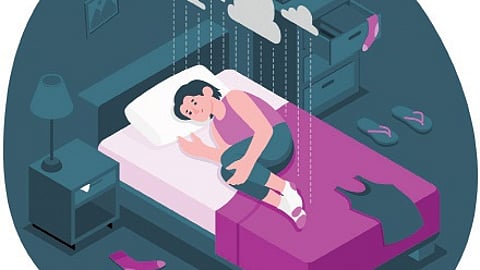Breaking the silence: Addressing India's depression crisis
KOCHI: Depression is often dubbed the silent epidemic, affecting millions while remaining largely unaddressed in public discourse. In India, the burden of depression is staggering, with the World Health Organization (WHO) estimating that over 56 million Indians are affected. Despite its prevalence, stigma, lack of awareness, and insufficient mental health resources often prevent individuals from seeking help.
Epidemiology
Recent studies indicate that the prevalence of depression in India is around 3.5% of the population, but this figure may be an underrepresentation.
Factors contributing to the high incidence include rapid urbanisation, economic pressures, social isolation, and cultural stigma surrounding mental health. The pandemic exacerbated these challenges, leading to increased levels of anxiety, stress, and depressive symptoms across various demographics.
Children and adolescents are particularly vulnerable. A study revealed that one in five adolescents in India experiences depressive symptoms, highlighting the need for early detection and intervention.
Symptoms
Recognising the symptoms is crucial for early intervention. Common symptoms include:
Persistent Sadness: A lingering feeling of sadness or emptiness
Loss of Interest: A significant decrease in interest or pleasure in activities once enjoyed, including hobbies, socialising, or work
Fatigue: Persistent tiredness or lack of energy, making daily tasks feel overwhelming
Sleep Disturbances: Changes in sleep patterns, such as insomnia or sleeping too much
Appetite Changes: Significant weight loss or gain due to changes in appetite
Feelings of Worthlessness: Persistent negative thoughts about oneself, feeling like a burden to others
Difficulty Concentrating: Trouble focusing, making decisions, or remembering details
Irritability: Increased agitation or frustration over minor issues
Physical Symptoms: Unexplained aches, pains, or digestive issues without a clear medical cause
Thoughts of Death or Suicide: Recurrent thoughts about death, self-harm, or suicide.
If you or someone you know is experiencing these symptoms for more than two weeks, it’s essential to seek help.
A case scenario
Consider Priya, a 30-year-old software engineer living in Bengaluru. Over the past year, she has been feeling persistently sad, losing interest in activities she once enjoyed, and experiencing fatigue. Despite these symptoms, Priya continues to go to work. Her friends notice her withdrawal but attribute it to her busy schedule. Priya, meanwhile, is hesitant to seek help, fearing judgment from her peers and family.
Eventually, she confides in a colleague, who encourages her to consult with a mental health professional. Upon evaluation, Priya is diagnosed with moderate depression. With therapy and support, she begins to understand her feelings, learns coping strategies, and gradually starts to reclaim her joy and productivity.
As Priya’s therapist states, “Acknowledging that you need help is not a sign of weakness; it’s the first step towards healing.” This sentiment is crucial for many individuals who struggle in silence.
Medications & therapy
Depression is a complex condition, and treatment often requires a multi-faceted approach.
Medications: Antidepressants, such as SSRIs (selective serotonin reuptake inhibitors), are commonly prescribed and can help regulate mood and alleviate symptoms.
Therapy: Cognitive behavioural therapy (CBT) and other forms of psychotherapy are effective in addressing the underlying issues contributing to depression.
Screening for depression
We can use a simple screening tool based on three questions as designed by WHO:
Over the past two weeks, have you felt little interest or pleasure in doing things you usually enjoy?
Have you been feeling down, depressed, or hopeless most of the day, nearly every day?
Have you experienced difficulty sleeping or sleeping too much, or have you noticed a change in your appetite?
If you answered “Yes” to any of these questions, it may be time to seek support.
Let us commit to breaking the silence and addressing this critical public health challenge together. Remember, seeking help is a sign of strength, and the path to recovery begins with a single step.
Mind and body
Got health concerns you want to share with a doctor? Are you looking for credible answers regarding symptoms, medicines or lifestyle disorders? Write to us on cityexpresskoc@newindianexpress.com, and we will get healthcare professionals to answer them.

